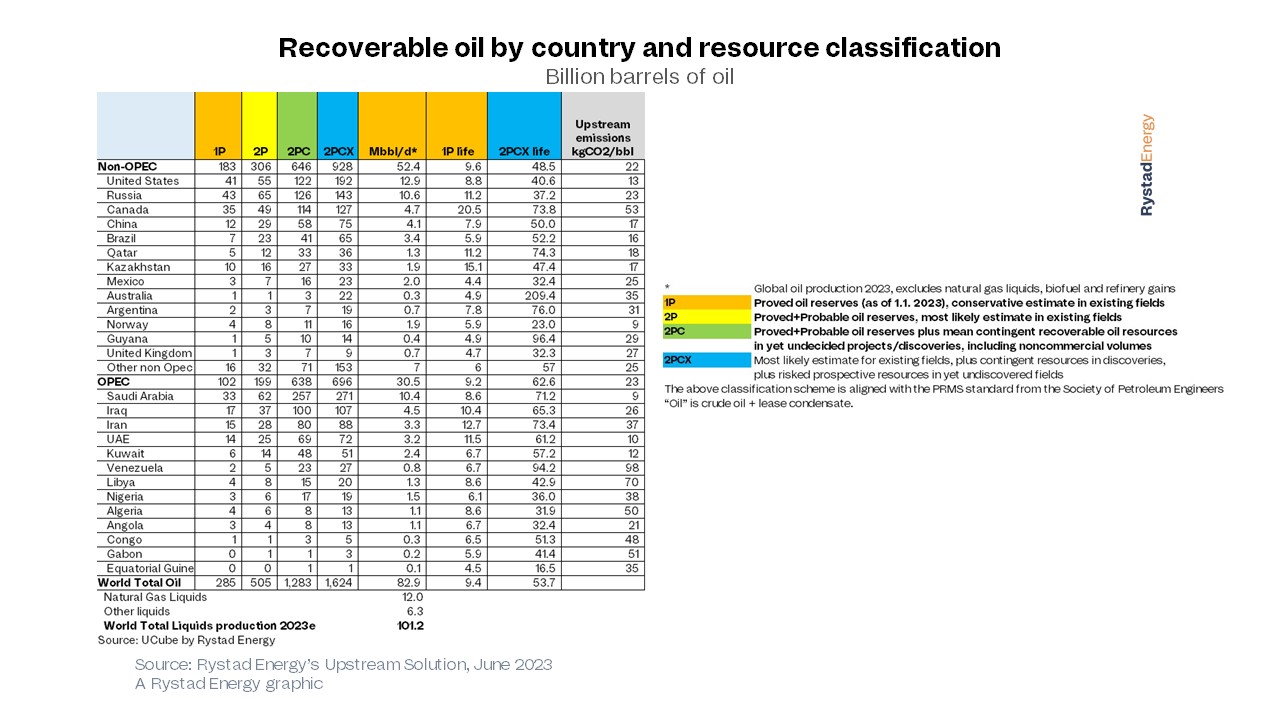
In a statement sent to Rigzone recently, Rystad Energy revealed that, according to its research, total global recoverable oil reserves now stand at 1.624 trillion barrels.
Rystad highlighted in the statement that, since the company’s previous reserves report, 30 billion barrels of crude oil have been extracted, “the same level seen in 2018 and 2019”, and revealed that 84 billion barrels have been added in fields, discoveries, and exploration prospects. Increased reserves in producing fields and approved projects in 2022 amount to 71 billion barrels, while 13 billion barrels were found in new discoveries during 2022, Rystad pointed out.
Although 1.624 trillion barrels of oil are technically recoverable, fewer than 1.3 trillion barrels are likely to be economically viable before 2100 at an average Brent price of $50 per barrel, Rystad noted in the statement.
“The upstream sector is working hard to reduce greenhouse gas emissions from oilfields, however, even with these mitigation measures and governmental efforts, if global warming is to be successfully limited to 1.6°C, only half of the world’s recoverable reserves would be required,” Rystad Energy CEO Jarand Rystad said in a company statement.
In its statement, Rystad revealed that Saudi Arabia ranks first in terms of total recoverable oil with 273 billion barrels.
The U.S. ranks second with 186 billion barrels, Russia ranks third with 140 billion barrels, and Canada ranks fourth with 122 billion barrels, Rystad outlined in the statement.

In a graph accompanying the statement, the majority of Saudi Arabia’s recoverable oil is categorized as ‘other onshore’, while the majority of U.S. recoverable oil is categorized as shale/tight oil. The majority of Russia’s recoverable oil is also categorized as other onshore in the graph and the majority of Canada’s recoverable oil is categorized as oil sands.
Every year, Rystad shares an update of its analysis of the global energy landscape and provides an independent, data-based, evaluation of the world’s recoverable oil reserves, Rystad noted in the statement. Recoverable oil corresponds to the industry term ‘remaining technically recoverable crude oil and lease condensate’, i.e. expected volumes, including fields, discoveries and risked future discoveries, the company clarified in the statement.
Rystad noted in the statement that the timestamp of its newest resource assessment is January 1, 2023.
Previous Total Proved Reserves
According to the last statistical review of world energy to show oil reserves information, which was published by BP in 2021, the world’s total proved oil reserves stood at 1.732 trillion barrels at the end of 2020.
Of this figure, 1.472 trillion was found in non-OECD countries, 1.214 trillion was found in OPEC countries, 517.7 billion was in non-OPEC countries, 260 billion was in OECD countries, and 2.4 billion was in Europe, BP’s 2021 Statistical Review of World Energy showed.
The country with the most proved oil reserves at the end of 2020 was Venezuela, with 303.8 billion barrels, according to the review, which placed Saudi Arabia in second with 297.5 billion barrels, and Canada in third with 168.1 billion barrels.
The world’s total proved reserves stood at 1.734 trillion barrels at the end of 2019, 1.636 trillion barrels at the end of 2010, and 1.300 trillion barrels at the end of 2000, the review highlighted.
The country with the most proved oil reserves at the end of 2019 was also Venezuela, with the same figure it had at the end of 2020, the review pointed out. Venezuela also ranked top at the end of 2010 with 296.5 billion barrels and Saudi Arabia ranked top at the end of 2000 with 262.8 billion barrels, according to the review.
BP’s 2022 statistical review of world energy had no information on oil reserves. The latest statistical review of world energy, which was published by the Energy Institute (EI) in June, also had no information on oil reserves.
Back in February, BP and the EI announced in a joint statement that the new “custodian” of the statistical review of world energy would be the EI.



